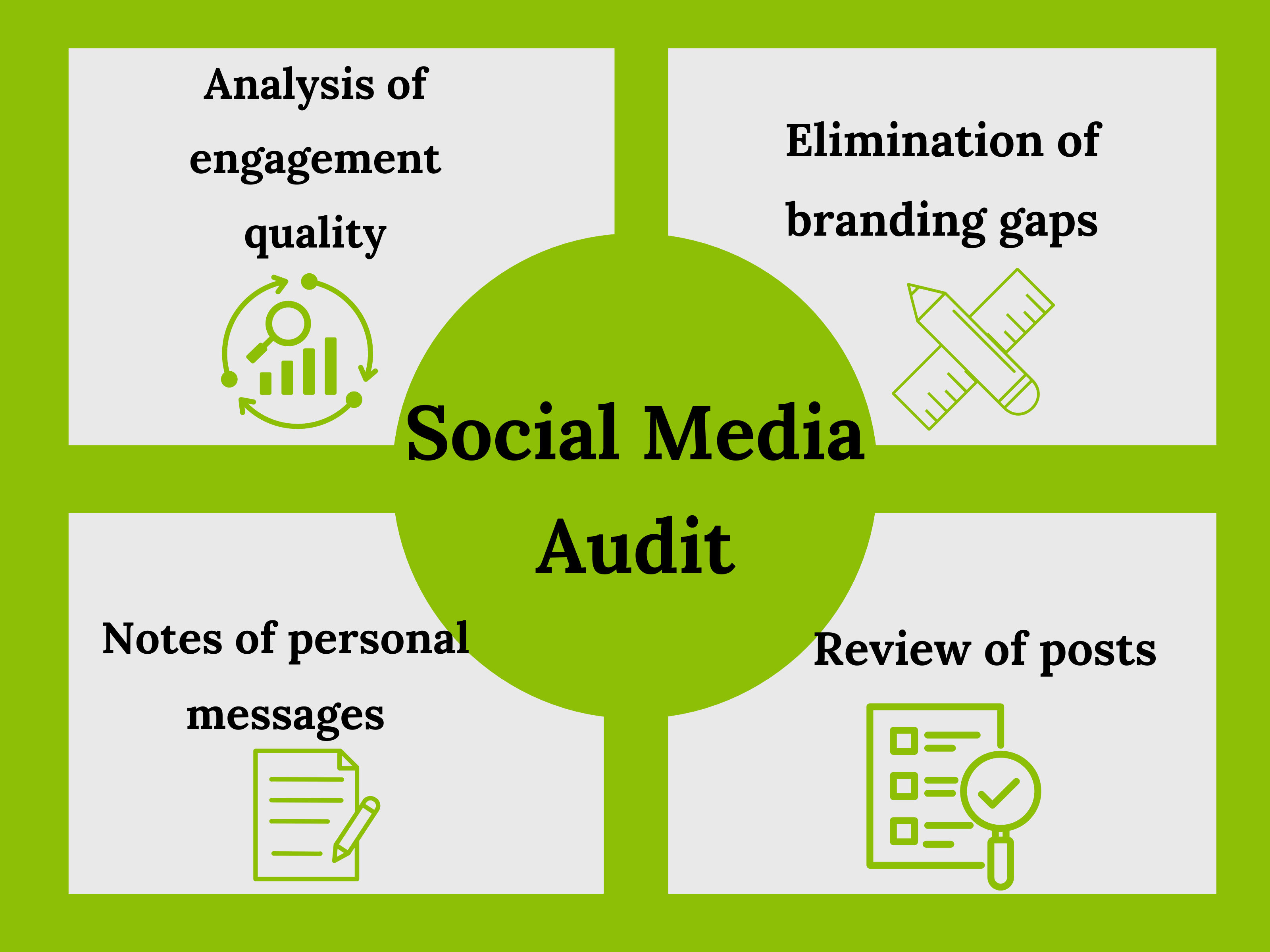Comprehensive Guide to Conducting a Social Media Audit

Staying competitive and effectively engaging your audience requires continuous evaluation and adaptation. Social media audit is a process that helps you understand your current social media performance, identify areas for improvement and develop a strategy to achieve your goals.
This comprehensive guide will explore what should be included in a social media audit and how to conduct one effectively.
Define Your Goals and Objectives
Before diving into the audit process, it’s essential to establish clear goals and objectives. Determine what you hope to achieve with your social media presence, such as increasing brand awareness, driving website traffic, generating leads and sales, enhancing customer engagement, building a community, or improving customer service. Having well-defined goals will guide your audit and help you measure success more accurately.
Compile Your Social Media Accounts
Start by making a comprehensive list of all your social media accounts. This includes not only the main platforms like Facebook, Twitter, Instagram, LinkedIn, and YouTube but also any secondary accounts, pages, or groups. Ensure you have access to all accounts and note down any that are no longer active or necessary.
Evaluate Your Social Media Profiles
Next, evaluate the completeness and consistency of your social media profiles. Ensure that your brand’s visual identity, messaging, and information are consistent across all platforms. Check profile pictures and cover photos to make sure they are high-quality, relevant, and consistent. Review bios and descriptions to ensure they accurately reflect your brand and include relevant keywords. Verify that all links (website, landing pages, contact info) are correct and up-to-date. Additionally, ensure that your brand voice and tone are consistent with your brand’s identity.
Analyze Your Audience
Understanding your audience is critical for effective social media marketing. Analyze your followers to determine their demographics, interests, and behaviours. Use platform analytics tools, such as Facebook Insights and Twitter Analytics, to gather data on demographics like age, gender, location, and language. Identify content preferences and engagement patterns. Track changes in your follower growth over time and compare your audience demographics to your target audience.
Assess Your Content
Review the content you’ve posted on each platform. Look at the types of content, posting frequency, and engagement levels to identify what’s working and what’s not. Categorize your posts by type (text, images, videos, links, stories, live streams) and platform. Analyze engagement metrics, such as likes, comments, shares, retweets, and views, to determine effectiveness. Identify your top-performing posts and analyze why they were successful. Assess your posting frequency and determine the optimal times for your audience.
Evaluate Engagement and Interaction
Engagement is a key indicator of your social media performance. Evaluate how your audience interacts with your content and how you respond to them. Measure engagement rates by dividing total engagement (likes, comments, shares) by the number of followers. Track response times to comments and messages, aiming to improve them if necessary. Analyze the sentiment of comments and messages (positive, negative, neutral) and assess your efforts in fostering a community and encouraging user-generated content.
Analyze Competitor Performance
Understanding how your competitors perform on social media can provide valuable insights and opportunities for improvement. Identify your main competitors and gather data on their social media performance using analytics tools. Compare follower counts, engagement rates, and content strategies. Identify the types of content competitors are posting and their performance.
Conduct a SWOT Analysis
A SWOT analysis helps you identify the strengths, weaknesses, opportunities, and threats related to your social media strategy. Determine what you are doing well, where you can improve, what opportunities you can leverage, and what external factors could affect your performance.
Review Analytics and Metrics
Use social media analytics tools to gather detailed data on your performance. Focus on key metrics that align with your goals, such as reach and impressions, engagement (likes, comments, shares, retweets), clicks and traffic, conversion rates, and follower growth. Regularly track and compare metrics to identify trends and adjust your strategy accordingly.
Assess Paid Social Media Campaigns
If you’re running paid social media campaigns, evaluate their performance separately. Analyze ad spend, ROI, and overall effectiveness. Review campaign reports from each platform’s ad manager and compare campaign performance against objectives. Identify which ads performed best and why.
Develop Actionable Insights and Recommendations
Based on your audit findings, develop actionable insights and recommendations to improve your social media strategy. Identify key areas for improvement and set SMART goals (Specific, Measurable, Achievable, Relevant, Time-bound). Create an action plan outlining specific actions to achieve your goals and assign responsibilities to team members. Regularly monitor progress and adjust strategies as needed.
Create a Social Media Audit Report
Document your findings in a comprehensive social media audit report. Include an executive summary, detailed analysis of each platform and metric, SWOT analysis, recommendations, and any additional data and resources. Use templates or tools to create the report and include visuals (graphs, charts) to illustrate key points. Share the report with relevant stakeholders.
Conclusion
Conducting a social media audit is an essential practice for any business looking to optimize its social media presence. By following the steps outlined in TheManindershow guide, you can gain valuable insights into your current performance, identify areas for improvement, and develop a strategic plan to achieve your goals. Regular audits will ensure that your social media strategy remains effective and aligned with your business objectives.

Recent Comments